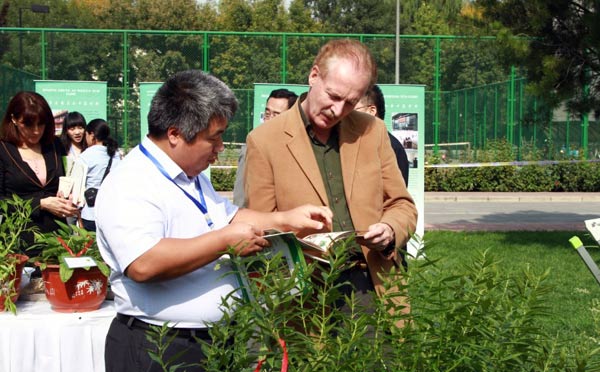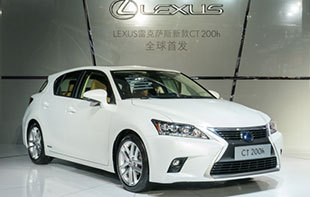

|
 A TCM expert explains the efficacy of Chinese herbs to a guest at a Traditional Chinese Medicine (TCM) cultural event for diplomats at Qijiayuan Diplomatic Residence Compound of . [Photo / chinadaily.com.cn] |
Although the European Union came out with a directive that governs the sale and purchase of herbal medicines in 2004, it has been more of a detriment, rather than an aid, for traditional Chinese medicine in Europe.
The system's faults are clearly evident from the fact that despite its widespread popularity, TCM is not considered to be traditional medicine. Some sections of the Chinese press have indicated that the EU directive is in fact a trade barrier for TCM's development in Europe. However, it is more of a mismatch between Western standards and Chinese medicine.
Issues for TCM became complicated in the UK earlier this year, after the Medicines and Healthcare Products Regulatory Agency of the UK urged the public to stop buying unregistered herbal products, citing safety concerns. The regulator is also believed to be considering a ban on the sale of all unlicensed herbal products in the UK from next year.
The MHRA's actions are against unregistered drugs, including patent Chinese drugs, but not against TCM as a whole.
When the EU announced its herbal drug directive in April 2004, it said that all botanicals would enjoy a transitional period of seven years in the European markets, after which they would have to be registered. From April 2011, all unregistered products, including TCM, cannot be imported into the EU market, it said.
The EU had indicated that the herbal drug directive aims to provide a unified system of standards and regulations across all the 28 member nations. The MHRA statement, however, is UK-specific and pertains to just some sections of TCM. It does not represent the views of all EU nations.
The EU directive, on the other hand, includes not only TCM, but other types of herbal medicines also. According to the European Chamber of Commerce for Traditional Chinese Medicine, the EU herbal medicine market is estimated to be about 19.4 billion euros ($26 billion), with more than 1,270 kinds of herbal medicines in circulation. More than 60 percent of the European population have used herbal medicines, mostly home-grown botanicals.
If TCM wants to make its mark in Europe, it is important for Chinese companies to find local partners because they are familiar with local rules and regulations.
Many Chinese companies have taken the easier option of registering TCM products as food or food supplements. As a result, many Europeans now treat TCM as food rather than medicine. They believe it is pharmacologically innocuous and you can freely take it. However, both Chinese and Western medicine streams involve prescription drugs and taking them blindly could prove harmful.
Overall, TCM has not fared well in exports. In 2012, the TCM industry was valued at 515.6 billion yuan ($84.6 billion), but exports accounted for just 16 billion yuan.
The European market accounted for 47 percent of the global market for herbal medicines.
Since there are different regulations in the various EU nations, Chinese enterprises can find the markets with regulations that best suit their products. Nations such as the Netherlands have a relatively relaxed regulatory regime.
Chinese medicinal decoctions and single flavor granules can still be sold in the EU as food or food supplements. Chinese patent drugs may be the real breakthrough for TCM in Europe because it is easy to identify the ingredients and production procedures are similar to Western medicines.
The author is a professor at Nanjing University of Chinese Medicine.
 Largest span timber arch bridge
Largest span timber arch bridge
 Porsche 911 Turbo S Asian premiere fascinates Auto Guangzhou
Porsche 911 Turbo S Asian premiere fascinates Auto Guangzhou
 Auto Guangzhou witnesses new Porsche sports cars Asia Premiere
Auto Guangzhou witnesses new Porsche sports cars Asia Premiere
 2013 Guangzhou auto show carmakers' eventers
2013 Guangzhou auto show carmakers' eventers
 Models at Volvo pavilion at 2013 Guangzhou auto show
Models at Volvo pavilion at 2013 Guangzhou auto show
 Lexus new hybrid hatch CT200h world premiere in Guangzhou
Lexus new hybrid hatch CT200h world premiere in Guangzhou
 New C-X17 showcases Jaguar's crossover concept
New C-X17 showcases Jaguar's crossover concept
 Acura all-new 2014 MDX comes to China
Acura all-new 2014 MDX comes to China